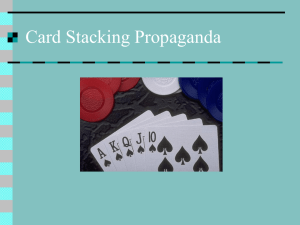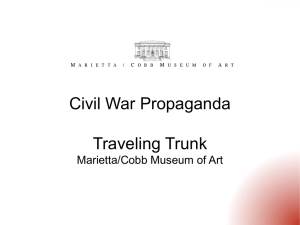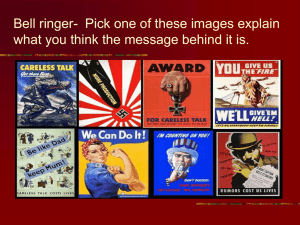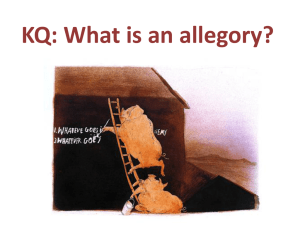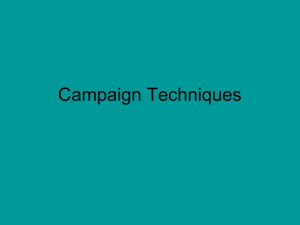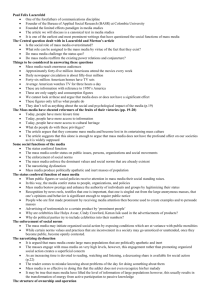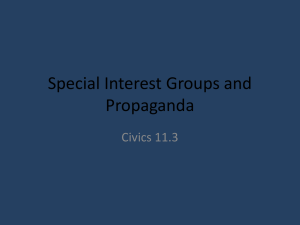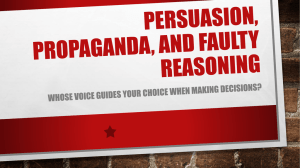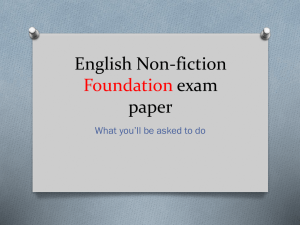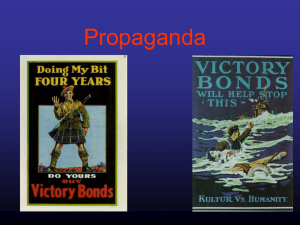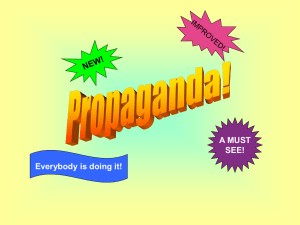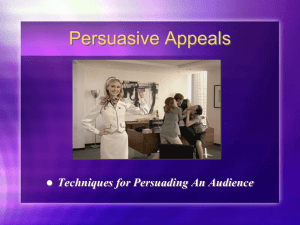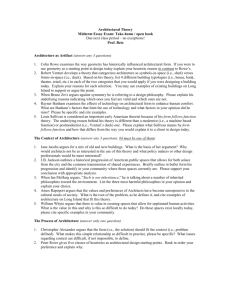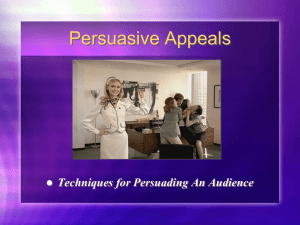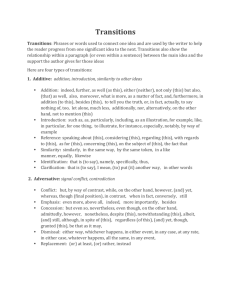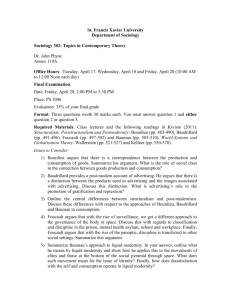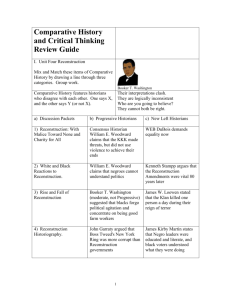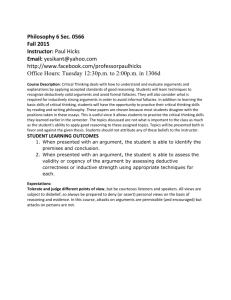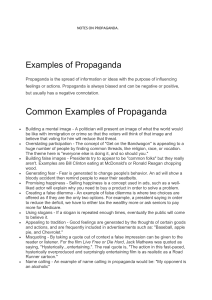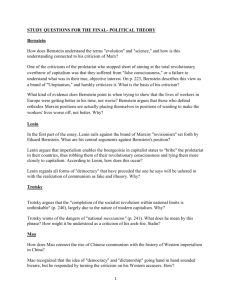Propaganda Powerpoint
advertisement
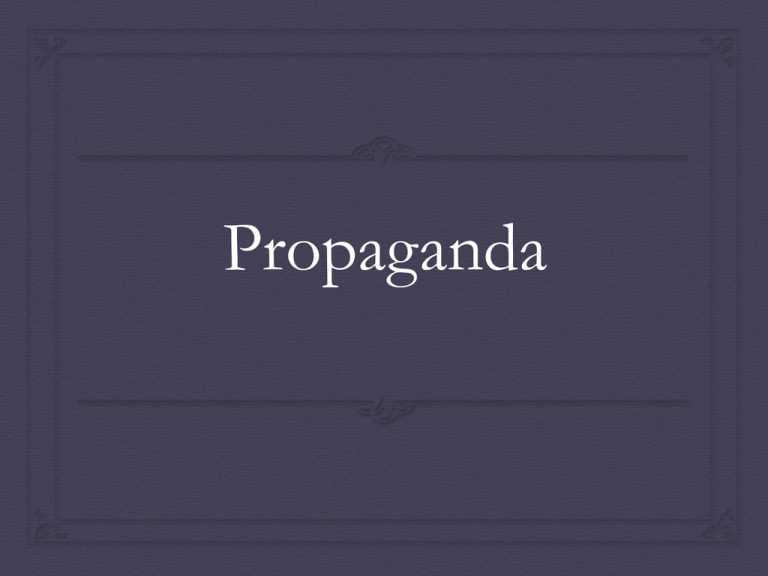
Propaganda Propaganda Techniques Propaganda techniques are methods and approaches used to spread ideas to further a cause. The cause could be political, commercial, religious, or civil. Propaganda Techniques Are Used To: Manipulate the readers’ or viewers’ reason and emotions Persuade you to believe in something or someone Persuade you to buy an item Persuade you to vote a certain way Name Calling Attaching a negative label to a person or thing. Commonly seen when people avoid supporting their own opinion with facts. Rather than explain what he/she believes in, he/she will try to tear his/her opponent down. Glittering Generalities Uses important-sounding “glad words” that have little or no real meaning. Used in general statements that cannot be proved or disproved. Examples: good, honest, fair, and best. Transfer An attempt is made to transfer the prestige of a positive symbol to a person or an idea. Example: the American flag as the backdrop of a political event makes the implication that the event is patriotic in the best interest of the U.S. False Analogy Two things that may or may not really be similar are portrayed as being similar. Example: “Employees are like nails. Just as nails must be hit on the head to make them work, so must employees.” Why is this an example of a faulty analogy? Testimonial When “big name” personalities are used to endorse a product. Example: Katy Perry endorsing Proactiv When you see a celebrity endorsing a product, remember to ask yourself how much the celebrity actually knows about the product Plain Folks Uses a folksy approach to convince us to support someone or something. This type of advertisement depicts ordinary-looking people doing ordinary things. Example: a Ford or Chevrolet commercial Card Stacking This term comes from stacking the deck in your favor, and is used to slant a message. Key words or unfavorable statistics may be omitted in an ad, leading to a series of halftruths. Keep in mind that an advertiser is under no obligation to tell “the truth, the whole truth, and nothing but the truth” Bandwagon This approach encourages you to think that because everyone else is doing something, you should do it too, or you will be left out. Either/Or Fallacy Also called the “black-and-white” way of thinking, meaning there is no middle ground or gray area You are either for something or against something Used to polarize issues Faulty Cause and Effect This technique suggests that because B follows A, A must cause B. Remember: just because two events or sets of data are related does not necessarily mean that one caused the other to happen. Contradiction Information is presented that is in direct opposition to other information within the same argument. Example: If someone stated that schools were overstaffed, but later argued for the necessity of more counselors. Accident Someone fails to recognize (or conceals the fact) that an argument is based on an exception to the rule. Example: By using selected scholarathletes as the norm, one could argue that athletics are vital to improving the academic performance of all students. False Cause A temporal order of events is confused with causality; or, someone oversimplifies a complex causal network. Example: Stating that poor performance in schools is caused by poverty; poverty certainly contributes, but it is not the only factor. Begging the Question A person makes a claim then argues for it by advancing grounds whose meaning is equivalent to that of the original claim. Also called “circular reasoning.” Example: Someone argues that schools should continue to have textbooks read from cover to cover to ensure that students are welleducated. When asked to define “welleducated,” the person says, “knowing what is in the textbooks.” Evading the Issue Someone sidesteps an issue by changing the topic. Example: When a defendant pleads his/her Fifth Amendment right. Arguing from Ignorance Someone argues that a claim is justified simply because its opposite cannot be proven. Example: A person argues that voucher programs will not harm schools, since no one has ever proven that vouchers have harmed schools. Composition and Division Composition involves an assertion about a whole that is true of its parts. Division is the opposite: an assertion about all of the parts. Example: When a school holds up its above-average scores and claims that its students are superior, it is committing the fallacy of division. Overall scores may be higher, but that does not prove all students are performing at that level. Likewise, when conservatives point to the welfare system being abused, the fallacy of composition is being committed; the behavior of some people cannot serve as proof of the behavior of all people. Poisoning the Well A person is so committed to a position that he/she explains away absolutely everything offered by others in opposition. Example: A pro-life vs. pro-choice debate Ad Hominem A person rejects a claim on the basis of derogatory facts (real or alleged) about the person making the claim. Example: Someone rejects President Clinton’s reasons for lifting the ban on homosexuals in the military because of Mr. Clinton’s draft record. Appealing to Force Someone uses threats to establish the validity of the claim. Example: Opponents of yearround school threaten to keep their children out of school during the summer months. Appeal to Authority Authority is evoked as the last word on the issue. Example: Someone uses the Bible as the basis for his/her arguments against specific school reform issues. Appeal to the People Someone attempts to justify a claim on the basis of popularity. Example: Opponents of yearround school claim that students would hate it. Appeal to Emotion An emotion-laden “sob” story is used as proof for a claim. Example: A politician uses a sad story of a child being killed in a drive-by shooting to gain support for stricter gun laws.
